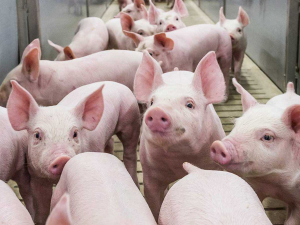M.I.A.
OPINION: The previous government spent too much during the Covid-19 pandemic, despite warnings from officials, according to a briefing released by the Treasury.
 Relaxation of the COVID-19 lockdown rules might still not be enough to prevent an animal welfare crisis, says Kiwi pork producers.
Relaxation of the COVID-19 lockdown rules might still not be enough to prevent an animal welfare crisis, says Kiwi pork producers.
The country’s pork producers say relaxation of the COVID-19 lockdown rules might still not be enough to prevent an animal welfare crisis on the country’s pig farms.
They say pig farming is geared almost entirely to domestic consumption, depends on weekly throughput with no spare capacity, and unlike red meat has no established export market to take up the slack.
With the forced closure of restaurants and independent butchers, they are hurting, says NZ Pork chief executive David Baines.
“50% of our normal market has been taken away,” he told Rural News.
While butchers have been allowed to process carcasses for supermarkets, they are not classed as essential businesses for public shopfront retail. An April 7 decision to allow contactless home delivery with online or phone ordering offers some relief, but Baines says it remains to be seen whether that will alleviate the surplus of pigs on-farm.
“For some butchers, it will not be financially viable to only operate on a home delivery basis and we will be closely monitoring the supply chain over the coming weeks to assess the impact,” said Baines.
“That’s why independent butchers, like dairies, should be allowed to open so long as they can take the necessary precautions to prevent the spread of COVID-19.”
Baines points out that butchers normally use whole-carcass pigs rather than a carton product.
He says the country’s six pork abattoirs, already constrained by social distancing and fewer staff, are under further pressure because of the need to break the carcasses down – whereas that would have been only 24% of their normal throughput.
However, he says NZ Pork was encouraged by the level of co-operation throughout the supply chain to move pigs and the willingness from small goods processors to use local product, he said.
New Zealand’s total pig meat consumption is 62% imported, most of it processed into bacon and ham and injected products, Baines explains.
“We’ve gone to them and asked them to put their imports on hold and use our New Zealand production instead.
“A couple of the big ones in particular have been very understanding and very co-operative. But that’s come at a significant cost to the industry because one of the attractions for imports is that it’s considerably cheaper than our New Zealand-produced product.”
NZ Pork is also looking at developing export outlets, but that requires country to country agreements. Baines says MPI is working as quickly as possible to develop a pathway for product to go to Singapore, where there is strong demand.
Jason Palmer, who manages a 500-sow operation at Dunsandel producing around 250 pigs a week, says he is living “week to week” and working closely with wholesalers as he tries to keep moving pigs through his system.
“It’s not a welfare issue yet, but we’re trying to put measures in place to avoid that situation,” he told Rural News. “We are very reliant on our pigs going out the door every week.”
Palmer says he knew of farmers having to hold pigs back for up to a week but was not aware of any who had yet had to destroy pigs on farm – which would be the worst-case scenario.
Baines said some farmers had decided to dispose of animals on farm, such as those at the end of their productive life which might otherwise have gone to be processed as low value ‘choppers’.
“But that’s not a welfare-driven decision. It’s a commercial one.”
The Meat Industry Association of New Zealand (MIA) today announced that Chief Executive Officer Sirma Karapeeva has resigned from the role.
The winners of the 2026 Hawke’s Bay/Wairarapa Dairy Industry Awards were announced at the annual awards dinner held at Copthorne Solway Park in Masterton on Thursday evening.
Environment Southland is welcoming this week’s decision by the Environmental Protection Authority (EPA) to approve the release of Blaptea elguetai, a leaf‑feeding beetle that will help control the highly invasive Chilean flame creeper.
This March, the potato industry is proudly celebrating International Women’s Day on 8 March alongside the International Year of the Woman Farmer, recognising the vital role women play across every part of the sector — from paddocks and packhouses to research, leadership, and innovation.
Fruit trader Seeka posted a record profit and returns to shareholders in 2025.
Recent weather events in the Bay of Plenty, Gisborne/Tairawhiti, and Canterbury have been declared a medium-scale adverse event.

OPINION: A mate of yours truly reckons rural Manawatu families are the latest to suffer under what he calls the…
OPINION: If old Winston Peters thinks building trade relations with new nations, such as India, isn't a necessary investment in…